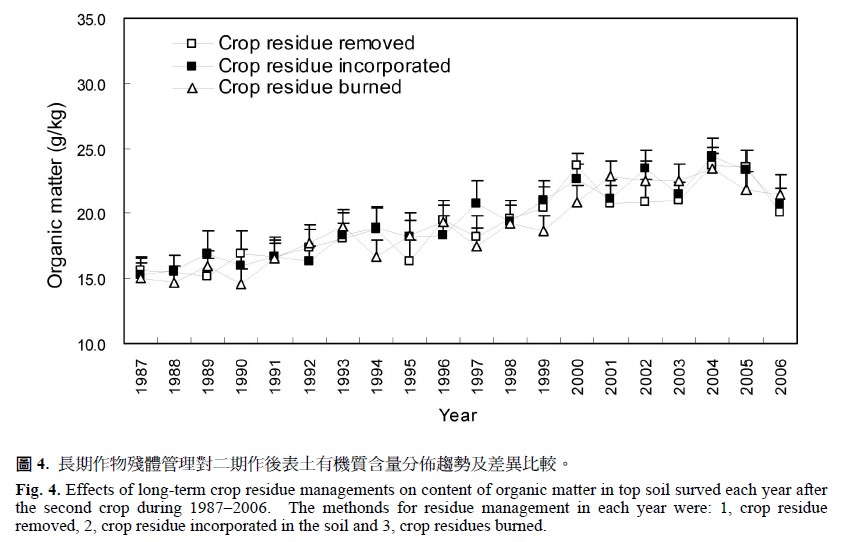All issues

Author:Tseng-Wei Tan* and Kuei-Nuan Chen
Abstract:
A long-term experiment was conducted from 1987 to 2006 in a field of noncalcareous sandstone and slate alluvial soil at the experimental farm of Taiwan Agriculture Research Institute, Wufeng, Taichung, Taiwan, to evaluate the effects of cropping systems and crop residue managements on content of soil organic matter in topsoil and subsoil. In this study, there were four cropping systems including Ⅰ, Rice-Rice monoculture; Ⅱ. Rice-Corn rotation; Ⅲ, Corn-Rice rotation and Ⅳ, Corn-Corn monoculture and three crop residue management methods, including 1, manual removal of crop redisues; 2, incorporation of crop residues in the soil and 3, burning of crop residues. Results showed that the content of soil organic matter was significantly (P < 0.05) higher in the treatment of continuous corn-corn monoculture, compared to the treatment of continuous rice-rice monoculture. In contrast, the content of soil organic matter was slightly lower in the treatments of rice-corn rotation and corn-rice rotation, compared to the treatment of rice-rice monoculture. All the four cropping systems, especially for the continuous corn monoculture, resulted in increased organic matter in the soil during the period of 20 years. Results also showed that burning or manually removal of crop residues had no significant (P > 0.05) effect on content of soil organic matter, compared to the treatment of incorporation of crop residues in the soil. This long-term study indicates that rice and corn grown in continuous monoculture or in rotation and under different managements of crop residues, burning, removal or buried in soil, cause no loss of organic matter in top soil and subsoil.
Key words:Rice, Corn, Cropping system, Monoculture, Rotation, Crop residue, Soil organic matter
Download:![]() PDF Links
PDF Links
- 1. Development of Tractor-Mounted Seedling Transplanter for Sweet Potato
- 2. Synergistic Effect of Additional Gas on the Toxicity of Phosphine to Sitophilus oryzae and Sitophilus zeamais (Coleoptera: Dryophthoridae)
- 3. Effects of Temperature and Solar Radiation on Growth Traits and Plant Elements in Purple Leafy Sweet Potato
 Submit your manuscript
Submit your manuscript
 Guide for authors
Guide for authors